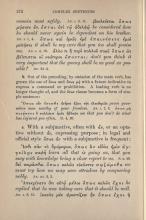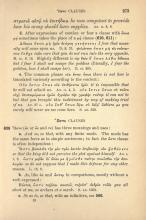638. Ὅπως is the general relative and indirect interrogative to ὡς and πῶς. Ὅπως clauses are like Ὡς clauses, but some types are more frequent (and others less frequent) with ὅπως. The following are common.
a. With a future indicative, after expressions of planning or effort, to denote the aim.
Σκεπτέον μοι δοκεῖ εἶναι ὅπως ἀσφαλέστατα μενοῦμεν.
It seems to me we must consider how we shall remain most safely.
Xen. Anabasis 1.3.11
βουλεύεται ὅπως μήποτε ἔτι ἔσται ἐπὶ τῷ ἀδελφῷ.
He considered how he should never again be dependent on his brother.
Xen. Anabasis 1.1.4
ὅπως καὶ ῡ̔μεῖς ἐμὲ ἐπαινέσετε ἐμοὶ μελήσει.
It shall be my care that you too shall praise me.
Xen. Anabasis 1.4.16
ἄλλο τι ἢ περὶ πολλοῦ ποιεῖ ὅπως ὡς βέλτιστοι οἱ νεώτεροι ἔσονται;
Don't you think it very important that the young shall be as good as possible?
Plato Apology 24d
b. Out of the preceding, by omission of the main verb, has grown the use of ὅπως and ὅπως μή with a future indicative to express a command or prohibition. A leading verb is no longer thought of, and the ὅπως clause becomes a form of simple sentence.
Ὅπως οὖν ἔσεσθε ἄνδρες ἄξιοι τῆς ἐλευθερίᾱς.
Prove yourselves men worthy of your freedom.
Xen. Anabasis 1.7.3
ὅπως μὴ ποιήσετε ὃ πολλάκις ῡ̔μᾶς ἔβλαψε.
See that you don't do what has injured you often.
Demosthenes 4.20
c. With a subjunctive, often with ἄν, or an optative without ἄν, expressing purpose; in legal and official style ὅπως ἄν with a subjunctive is frequent.
Ἴσθι πᾶν τὸ δρώμερον, ὅπως ἂν εἰδὼς ἡμὶν ἀγγείλῃς σαφῆ.
Learn all that is going on, that you may with knowledge bring a clear report to us.
Soph. Electra 40
δεῖ πειρᾶσθαι ὅπως καλῶς νῑκῶντες σῳζώμεθα.
We must try how we may save ourselves by conquering nobly.
Xen. Anabasis 3.2.3
Ἀπεκρῑ́νατο ὅτι αὐτῷ μέλοι ὅπως καλῶς ἔχοι.
He replied that he was taking care that it should be well.
Xen. Anabasis 1.8.13
ἱκανὸς μὲν φροντίζειν ἦν ὅπως ἔχοι ἡ στρατιᾱ̀ αὐτῷ τὰ ἐπιτήδεια.
He was competent to provide how his army should have supplies.
Xen. Anabasis 2.6.8
d. After expressions of caution or fear a clause with ὅπως μή sometimes takes the place of a μή clause (§§ 610 and 611).
Δέδοικα ὅπως μὴ ἡμῖν ἀνάγκη γενήσεται.
I fear that necessity will come upon us.
Demosthenes 9.75
φυλάττου ὅπως μὴ εἰς τοὐναντίον ἔλθῃς.
Take care that you do not run into the very opposite.
Xen. Memorabilia 3.6.16
Slightly different is
τὴν θεὸν δʼ ὅπως λάθω δέδοικα.
But I fear I shall not escape the goddess (literally, I fear the goddess, how I shall escape her).
Eur. Iphigenia in Taurus 995
e. The common phrase οὐκ ἔστιν ὅπως (there is not how) is translated variously according to the context.
Oὐκ ἔστιν ὅπως οὐκ ἐπιθήσεται ἡμῖν.
It is impossible that he will not attack us.
Xen. Anabasis 2.4.3
οὐκ ἔστιν ὅπως σὺ ταῦτα οὐχὶ ἀποπειρώμενος ἡμῶν ἐγράψω τὴν γραφὴν ταύτην.
It can not be but that you brought this indictment by way of making trial of us.
Plato Apology 27e
οὐκ ἔσθʼ ὅπως ὄψει σὺ δεῦρʼ ἐλθόντα με.
You surely will never see me come here.
Soph. Antigone 329


